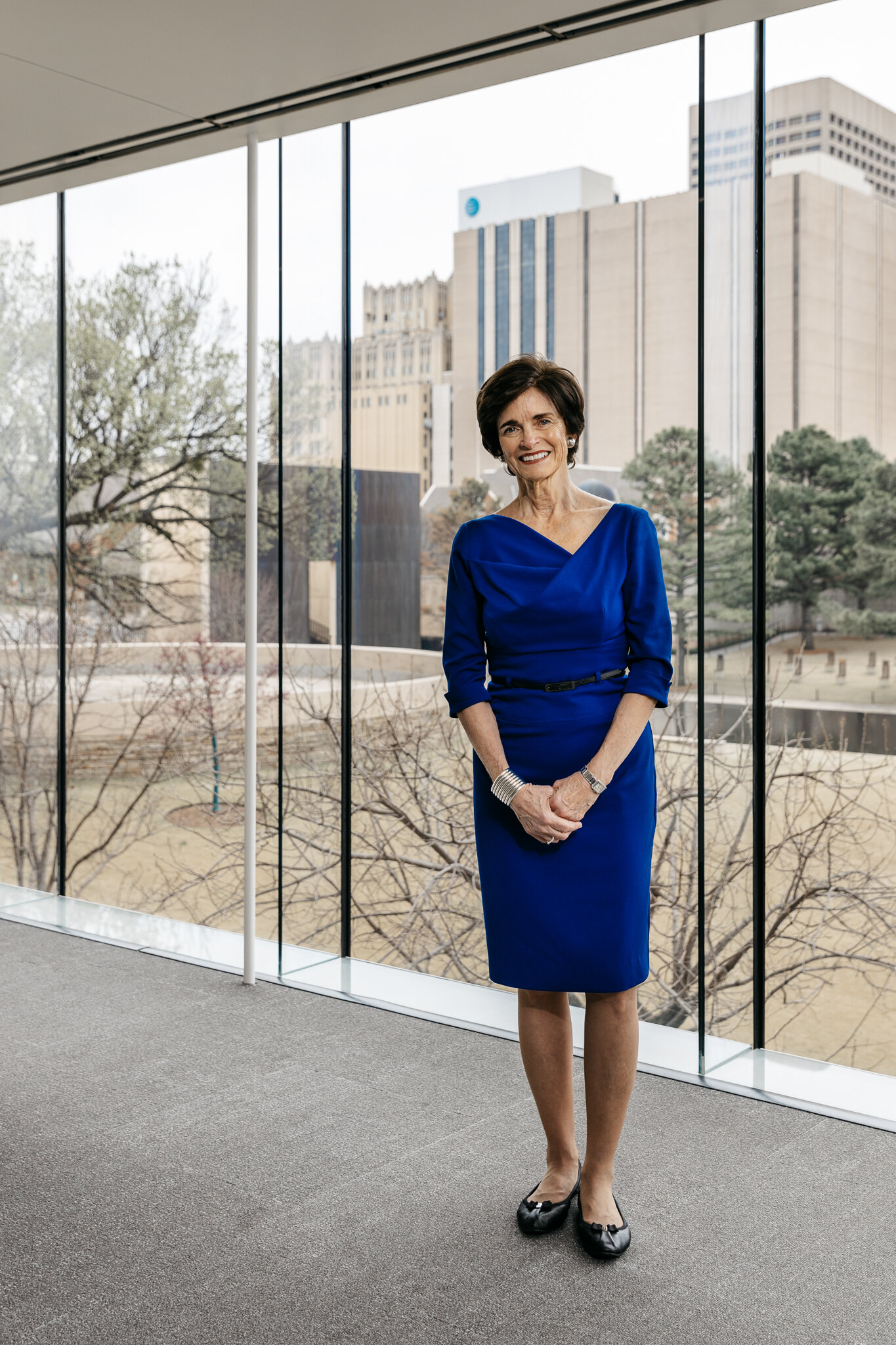Polly Nichols: Women of Influence
Polly Nichols is a thoughtful, articulate woman whose longstanding work with nonprofits has brought meaning beyond measure to her life and value beyond measure to the organizations she serves. This dedication of hers has been shaped and fostered in various ways, some lovely and some terrifying, over the course of her life, but when all is said and done, this is a woman who wields her influence with confidence and grace.
Nichols is slender, with an elegant carriage, a slight seriousness of manner and a precise way of speaking which she punctuates with wonderful flashes of her bright, beaming smile. It’s a contagious smile, like bursts of sparkling sunlight.
She’s always been a doer and a thinker. As a junior-high school student growing up in McAlester, Nichols was president of a girls’ club. It will come as a surprise to no one that one of her first orders of business was to draft a constitution for the club. The primary tenets were these: have an open mind at meetings; listen to all suggestions; consider all sides of an issue; and above all, pay attention. As she read them aloud one recent afternoon, she wondered aloud, “Now, what if we all did just that?”
Polly and her husband Larry Nichols, who is co-founder and former chairman, president, and chief executive officer of Devon Energy, married in 1971. “When we met, we had no idea the level of responsibility Larry would ultimately have with Devon,” she says. The couple has two children and four grandchildren, who are, these days, “what we are about,” she says.
The pair met in Washington, DC. Polly had finished her undergraduate degree in political science and a master’s degree in library science and was working at the Library of Congress at her first job. “We worked with the legislative branch and wrote speeches and did research,” she says. Husband-to-be Larry was clerking at the United States Supreme Court. Her formula for a good marriage? “You have to have the ability to grow and change together -- and to remember to laugh.” The two also enjoy mountain hiking together and share a deep love of traveling.
When Nichols reflects upon her volunteer career, she says that it all began with one simple but profound act: “The reason I volunteered was because somebody asked me.” Her volunteer education came in large measure from Junior League of Oklahoma City. “That was the true foundation of my training. It gave me confidence and made me realize that I wanted to be involved. My first placement was puppets. We did a puppet show about Johnny Appleseed.” Nichols went from puppets to eventually president of Junior League. She volunteered for, and served as board chair for, what is now Science Museum Oklahoma for more than two decades and for the United Way, the Oklahoma Center for Nonprofits, whose board she also chaired, and Baptist Hospital, among others.
One nonprofit which has benefitted from her tireless dedication is the Oklahoma City National Memorial, a cause near to her heart. On that beautiful spring morning 25 years ago, Nichols was seriously injured by the detonation of the bomb that left Oklahoma City forever changed. At the time, she was the executive director of the Oklahoma Foundation for Excellence, a post she held for seven years. Like many survivors of the Oklahoma City bombing, she finds herself with an unwavering understanding of what is truly important. “It’s people and relationships that are the most important things. If you don’t watch it, you can become too involved in activities and miss out on relationships.”
Nichols co-chaired the $29.1 million dollar fundraising drive to build the Oklahoma City National Memorial & Museum and serves on its board of directors, which she has chaired. She also serves on its executive committee. Her office 25 years ago was in the Journal Record Building, where the museum and its offices are now. “I can remember walking through the parking lot back then and wondering why they didn’t just cut down that lopsided tree in the middle of the lot. And guess what happened? That tree is the Survivor Tree, and it became our symbol of hope.”
Nichols says she hadn’t yet fully recognized that it’s not what’s on the outside that matters sometimes, “It’s the depth of your roots and your strength that make you what you are.” These days, Nichols loves nothing more than sitting beneath that beautiful Survivor Tree with her grandchildren, reading them a book and helping them put down strong roots of their own.
Note: Due to COVID-19, the Oklahoma City National Memorial & Museum has had to make some changes to the 25th anniversary remembrance ceremony. As before, there will be silence for 168 seconds, and the names of all 168 killed will be read one by one, but not live at the Oklahoma City National Memorial & Museum. Instead, The Memorial is producing an hour-long program, which the media will show at
9 a.m. April 19. The program also will be available on the memorial’s website, MemorialMuseum.com.
The museum is temporarily closed but the Memorial grounds are open.
photo: Kennon Bryce

